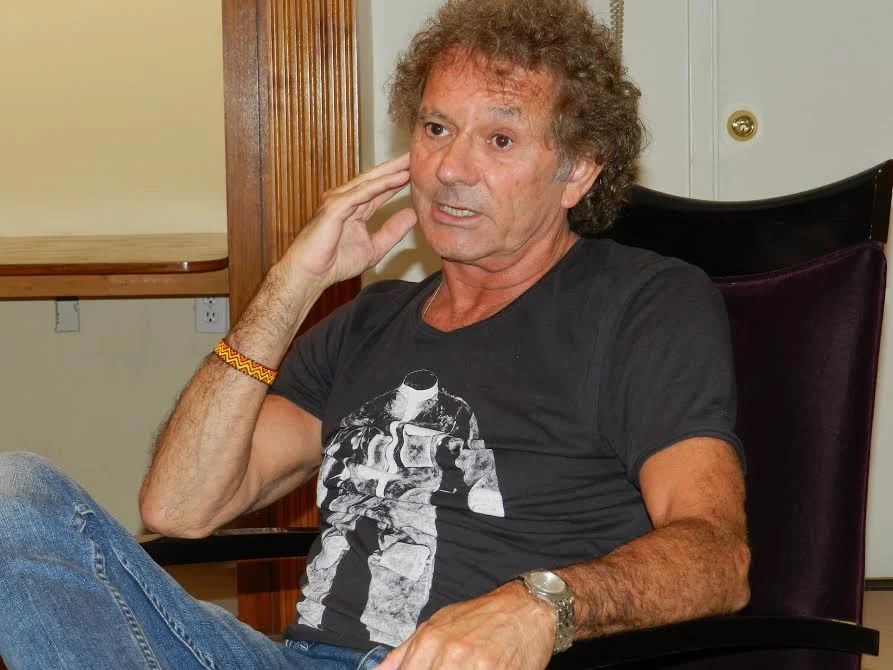I vividly recall the moment when the powerful vocals of Mickey Thomas filled my car radio in August 1985. I was driving from Claremont, California, heading to my final prenatal appointment before my daughter’s arrival. In my high-top LA Gear sneakers and scrunchie socks, the 19-year-old me felt an exhilarating spark as Thomas’s harmonies with Grace Slick soared through the air: “We built this city… we built this city on rock and roll.” Although I didn’t yet know who “Marconi on the trombone” was, I found myself eager to discover more. The music was electrifying, and I realized I was not alone in my enthusiasm.
Mickey Thomas’s journey to becoming the lead vocalist of Starship (formerly Jefferson Starship) and achieving multi-platinum success with the album Knee Deep in the Hoopla is a remarkable story shaped by pivotal events. Without the impact of Rock and Roll Hall of Famer Elvin Bishop and his timeless hit song, “Fooled Around and Fell in Love,” a pivotal phone call that altered his life probably would not have occurred.
Thomas became a lead and background vocalist for Bishop’s band in the 1970s. Reflecting on that time, he shared, “We had just finished laying down all the tracks for the album Struttin’ My Stuff and were getting ready to leave. The producer felt the record needed something extra. The song “Fooled Around and Fell in Love” by Bishop was recommended. Bishop tried recording the vocal track, but it didn’t quite fit his voice. I seized the opportunity when they asked me to lead. I had a strong feeling about that song.” His unique vocal style quickly garnered attention, leading to significant commercial success for the Elvin Bishop Band.
Among the finest voices in Album-Oriented Rock (AOR), Mickey Thomas has made a lasting impact. From his standout performance on Elvin Bishop’s 1976 hit to a string of chart-toppers with Jefferson Starship and later, Starship, Thomas’s signature tenor resonated throughout the ’70s and ’80s. Today, he continues to produce new music while honoring the classics with the current lineup of Starship. Recently, we had the privilege of discussing his life and career with Thomas.
Thomas’s career took a monumental turn when he was invited to join Jefferson Starship in 1979. This decision marked a defining moment in his musical path, solidifying his status as a rock icon.
Mickey Thomas’s remarkable contributions to rock music, characterized by his timeless voice and charismatic stage presence, have made him a beloved figure in the industry. He remains active in the music scene, consistently engaging with fans and showcasing his talent. As he continues to tour and release new material, Thomas’s legacy as a powerful rock vocalist endures, ensuring his place in music history.

The Evolution of Mickey Thomas and Starship
The 1980s marked a significant transformation for Jefferson Starship, culminating in the band’s rebranding as “Starship.” Under this new name and evolving musical style, Mickey Thomas and the band achieved remarkable commercial success, highlighted by their iconic hit, “We Built This City.” This song not only topped charts but also became a cultural touchstone of ‘80s rock nostalgia. Mickey Thomas remarked, “My favorite part of every show is seeing the crowd’s reaction to ‘We Built This City.’”
Following this success, the band released “Sara,” a heartfelt ballad that showcased Thomas’s exceptional ability to convey deep emotion through his vocals. Another standout track, “Jane,” further established Thomas as a capable and dynamic frontman.
Mickey Thomas’s impact on rock music extends far beyond his impressive vocal talent, which has remarkably stood the test of time. His charismatic stage presence has endeared him to fans, and his collaborations with various artists demonstrate his versatility and adaptability throughout the changing musical landscape.
Over the years, Thomas’s music has also made its mark on film soundtracks. He expressed particular fondness for the use of “Fooled Around and Fell in Love” in the bar scene of the movie Family Stone, featuring stars like Diane Keaton and Dermot Mulroney. According to him, “it was just a great scene and the perfect place for the song.” Interestingly, during a viewing of Guardians of the Galaxy, Thomas’s son recognized his father’s song playing when Peter Quill (Chris Pratt) introduces music to Gamora (Zoe Saldana). Excitedly, he told his friends, “Hey, that’s my dad!” This surprise connection to a new generation thrilled Thomas, who commented, “I love that the music is connecting to younger generations.”
Despite his legacy of timeless hits, Mickey Thomas remains passionate about performing and continues to tour regularly. When not on the road, he calls the desert home, where he actively participates in his community. Thomas and his wife own “Bowl of Heaven” located at The Village University Park on 36891 Cook Street, next to Roc’s Firehouse Grille. Inspired by an unforgettable smoothie they had at the beach, the couple opened the shop, which features some of Thomas’s Gold and Platinum records along with rock memorabilia, creating a unique atmosphere for visitors.
Mickey Thomas’s enduring contributions to rock music and his commitment to his craft ensure his place among the greats. As he continues to perform and connect with fans, his legacy remains vibrant, inspiring both long-time listeners and new generations alike.
Mickey Thomas: A Journey Towards a Timeless Christmas Album
My first encounter with Mickey Thomas took place in 2015 during an interview for Coachella Valley Weekly. At that time, he expressed a desire to record a Christmas album. Fast forward to December 2023, and he has made significant strides toward that goal, releasing two songs that mark the beginning of his anticipated album: “Have Yourself a Merry Little Christmas” and “It’s the Most Wonderful Time of the Year.” Both tracks are now available on major streaming platforms. “I really wanted to capture the feel of Bing Crosby and Judy Garland in these recordings,” Thomas shared, highlighting his deep appreciation for the classic songs and their original performers.
From our initial conversations, it was clear that Mickey Thomas is dedicated to connecting with his community. Since then, he has participated in the YMCA of the Desert’s Charity Golf Tournament on two occasions, served as a judge for a charity songwriting contest, and supported Animal Samaritans alongside his wife, Rachel. Few artists of Thomas’s caliber leave such a gracious and impactful legacy.
Looking ahead, Thomas’s next tour kicks off at Fantasy Springs Casino Resort on January 20, 2024, where Starship will share the stage with the Platinum Record recording artists, Foghat—a lineup that classic rock fans won’t want to miss. Starship Featuring Mickey Thomas will be backed by a talented band, including Jeff Adams on bass, John Roth on guitar, Phil Bennett on keyboards, Darrell Verdusco on drums, and powerhouse vocalist Cian Coey. “I love that we’re launching this tour from my own backyard,” Thomas expressed warmly.
Regarding his decision to record a Christmas single after all these years, Thomas stated, “Oh, I’ve always wanted to do Christmas music, a Christmas album. For years, I thought about it, but the real opportunity just never came up until now.” He communicated his desire to create Christmas music to his manager, who arranged a session with a Nashville producer. Thomas expressed a preference for traditional holiday songs, recalling, “I wanted to capture that vibe and feeling of the classic Christmas songs I grew up listening to, like Jack Jones, Andy Williams, and Nat King Cole. I’m not a fan of rocking up Christmas too much.”
Mickey Thomas’s commitment to preserving the warmth and nostalgia of classic Christmas music shines through in his recordings. “Christmas songs have the power to take you back to those happy times,” he explained, emphasizing the importance of feeling joy during the holiday season. With his new songs, Thomas hopes to evoke that same warm, nostalgic feeling for listeners, reminding us all of the magic of Christmas.
As Mickey Thomas continues to create and connect with fans through his music, his journey toward a Christmas album promises to be a heartfelt addition to his storied career.

Mickey Thomas’ Journey to Creating Music and His Iconic Moment with Elvin Bishop
The idea of making a complete Christmas CD has long been cherished by Mickey Thomas. Speaking about this goal, he shared, “It’s something I’ve wanted to do for years. So, we decided to test the waters first. In today’s music landscape, you don’t have to rush into a full album right away. You can start with just a couple of songs, see how people react. If they enjoy it, then by Christmas 2024, we’ll have a complete album ready.”
When envisioning his Christmas album, Mickey Thomas already has specific songs in mind. “I want to do ‘Silver Bells’ and ‘I’ll Be Home for Christmas,’” he explained. His goal is to evoke a warm, nostalgic feeling: “I’d love to create that cozy atmosphere where you’re sitting by the fire, watching snowflakes fall outside, maybe with a glass of brandy in hand.”
Meeting Elvin Bishop and Starting a Legendary Collaboration
Mickey Thomas’ iconic voice became widely known through his collaboration with Elvin Bishop. Reflecting on how they met, Mickey shared, “I first crossed paths with Elvin in 1972 while performing in San Francisco with my mentor, gospel singer Gideon Daniels. Gideon introduced me to Elvin, and we’d often jam together in local clubs around the city.”
Mickey later returned to Georgia in the early ’70s. It wasn’t long before fate intervened. “In 1973 and 1974, Elvin Bishop signed with Capricorn Records, based in Macon, Georgia. Knowing I was back in the area, Elvin invited me to contribute background vocals on one of his records. I drove up to Macon, and it went so well that when he returned to record his next album, he asked me back.”
That next album would become a turning point. Mickey remembered, “It was the record just before Struttin’ My Stuff.” “Elvin needed some vocal assistance and asked if I would want to join his band. We began touring together, and I even did lead vocals on some tracks.”
“Fooled Around and Fell in Love”: Its Creation
The collaboration between Mickey Thomas and Elvin Bishop reached its pinnacle with the hit song “Fooled Around and Fell in Love.” Initially, Elvin was set to sing it, but the producer, Bill Szymczyk, had a different vision. “Bill thought my voice would be a better fit for the track, so he asked if I’d like to give it a try,” Mickey said. “I jumped at the opportunity, and the result was magical.”
Remarkably, the recording was done in just two takes. “We recorded one recording prior to the guitar solo and another subsequent to it. That was it,” Mickey recalled. “The song became a huge hit and opened so many doors for me in the music industry.”
The success of Fooled Around and Fell in Love solidified Mickey Thomas as a prominent figure in rock and roll, and his collaboration with Elvin Bishop remains one of the most memorable in music history.
Looking Ahead
Mickey Thomas continues to evolve as an artist, exploring new avenues like the possibility of a full Christmas album. His rich history, from his early days with Elvin Bishop to his enduring solo career, showcases his incredible versatility and passion for music. Fans can’t wait to hear what Mickey Thomas has in store, whether it’s new holiday tunes or another iconic track that leaves a lasting impact on the world of music.
Mickey Thomas on Joining Jefferson Starship, Grace Slick’s Return, and the Band’s Success
Mickey Thomas had an incredible journey joining Jefferson Starship, stepping into the spotlight to replace legendary singers Marty Balin and Grace Slick. Recalling his entry into the band, Mickey explained, “It was definitely a daunting task. Craig Chaquico (guitarist) and I had worked on the soundtrack for Skate Out, a skateboard movie, but we hadn’t met during that project. We worked separately, so it was purely coincidental that we were both on that record.”
The turning point for Mickey Thomas came when one of Jefferson Starship’s roadies introduced his music to the band. Mickey shared, “Grace and Marty had both left, and the band was searching for a new direction. Not only were they missing vocalists, but the drummer, John Barbata, had been in a terrible car accident and was out for years. Ainsley Dunbar had just joined as the new drummer. One of the roadies brought a tape of my work with the Elvin Bishop Band and my solo album, saying, ‘Hey, check this guy out, he lives right here in the Bay Area.’ The band listened, and Paul Kantner gave me a call out of the blue.”
Mickey Thomas wasn’t expecting the invitation from Paul. “Paul asked me if I wanted to come over and listen to the new music they were working on, maybe even sing with the band. I was surprised, having come from a background of blues, R&B, and gospel, and I wasn’t sure how I would fit with Jefferson Starship musically. However, I made the decision to try it.

Recording “Jane” and the Evolution of Jefferson Starship
When Mickey Thomas first joined a rehearsal, the band introduced him to a new song called “Jane.” “I wasn’t expecting that sound,” Mickey recalled. “At that time, Jefferson Starship was known for Marty Balin’s ballads like ‘Count on Me’ and ‘Miracles.’ But ‘Jane’ was hard-hitting and edgy. We started jamming on it, and next thing I knew, we were in the studio recording Freedom at Point Zero.”
This bold new sound marked a shift in Jefferson Starship’s music, with Mickey Thomas taking on a central role in their evolution. His powerful vocals on tracks like “Jane” helped the band transition from their softer, ballad-heavy past to a more energetic, rock-driven future.
Grace Slick’s Return and Working Together
One of the highlights of Mickey Thomas’ time with Jefferson Starship was when Grace Slick rejoined the band. Despite the history between Grace and the band, Mickey was thrilled by her return. “I was very excited about Grace coming back. It was a positive thing for the band, and I was just like everyone else, excited and thrilled to have the chance to record, perform, and hang out with her.”
Their first collaboration after Grace’s return was on the track “Stranger” from the Modern Times album. Mickey shared, “We were wrapping up recording when Grace started coming around the studio. We asked her if she wanted to do a duet on ‘Stranger,’ and that was the first thing we did together.”
Grace soon officially rejoined the band, and from that moment on, Mickey and Grace developed a great working relationship. We had a great time together, and Grace was a strong, smart, and fascinating individual. Our voices blended well, and it was fun performing with her.”
The Success of Starship and the Risk of Reinvention
In the 1980s, Jefferson Starship transitioned into Starship, and the band set out to reinvent itself musically. According to Mickey Thomas, the band was fully prepared for the success that followed. We were aware that we were at a turning moment. The radio was changing, and we had to evolve if we wanted to remain relevant. Our goal was to use all the new recording technologies available to us at the time, and it was an adventure.”
Their gamble paid off with the release of the Knee Deep in the Hoopla album, which produced hits like “We Built This City” and “Sara.” However, the success came with some backlash, which Mickey acknowledged. “The critical stuff started coming later. Blender magazine, in the late ’90s, named one of our songs among the worst ever recorded, but by that time, we had already achieved major success.”
Mickey Thomas Reflects on the Success and Criticism of “We Built This City”
Mickey Thomas, the iconic voice behind some of Starship’s biggest hits, has had his fair share of both acclaim and criticism. One of the most talked-about songs, “We Built This City,” reached number one on various charts but later found itself at the top of a very different list—the worst songs ever recorded. Mickey Thomas reflects on this backlash with humor and perspective.
Blender Magazine’s ranking of ‘We Built This City’ as the worst song was unexpected. Even though there were other great songs in their top 10, including tracks from Stevie Wonder, Paul McCartney, Huey Lewis, and Phil Collins, it made me think, ‘Well, at least we’re in good company,'” Mickey shared.
Initially, Mickey was disappointed. “I thought, ‘Really? The worst song ever? “How did you even think of that?” But the counsel from his management changed his perspective. “If you’re going to be on a list, Mickey, always try to be number one,” my manager said. ‘Okay,’ I replied, and I accepted it.
After Blender published its infamous list, the backlash started to gain momentum. Other magazines and critics began creating their own “worst of” lists, contributing to the negative buzz around Starship. “Suddenly, we were on lists for things like the worst guitar solos ever recorded,” Mickey recalled. “The criticism didn’t start until almost 15 years after the song’s release.”
Understanding the Criticism
Mickey Thomas understands why “We Built This City” became a target for critics. “Many elder music journalists and fans disapproved of the 1980s music trends. They thought there was too much electronics, programming, sequences, and samples. ‘We Built This City’ almost became a symbol of that shift in the music industry, representing what many people disliked about the direction music was heading.”
Another reason the song faced criticism was the band’s legacy. Jefferson Airplane, which later changed its name to Jefferson Starship and finally to Starship, is where we come from. Our roots were in the counterculture movement and revolutionary music, so the expectations were higher. People saw us as sellouts, especially because of the stark contrast between the music of the ’60s and what we were doing in the ’80s.”
Despite the backlash, Mickey Thomas doesn’t let it affect him. “I don’t mind the criticism, but I now understand it. The song’s success speaks for itself, and it still resonates with fans today.”
Mickey Thomas: A Lasting Legacy
Regardless of the criticism surrounding certain tracks, Mickey Thomas‘ voice remains a defining part of American rock music. His contributions to both Jefferson Starship and Starship are integral to the evolution of rock during the ’70s and ’80s.
“It is evident that Mickey Thomas’s voice will always be a part of the American Songbook, reverberating throughout history, as we continue to appreciate the classic tunes and remarkable performances. Mickey’s ability to adapt and reinvent himself, even amidst controversy, has solidified his place in the annals of rock history.
The upcoming Starship performances offer fans the opportunity to relive the band’s greatest hits and celebrate the incredible journey of Mickey Thomas—a journey filled with both monumental success and challenging criticism, but always driven by a passion for music.
Conclusion
Mickey Thomas is a prominent name associated with influential figures in music and sports. Known for his powerful vocals, Mickey Thomas, the musician, rose to fame with Jefferson Starship and Starship, contributing to iconic 1980s hits. Meanwhile, Mickey Thomas, the Welsh footballer, gained recognition for his skillful career in professional football and his contributions to the Wales national team. Both have left lasting impacts in their respective fields.
Faqs About Mickey Thomas
1. Who is Mickey Thomas?
Mickey Thomas is an American rock singer best known for his work with Jefferson Starship and Starship. He became the lead vocalist of Jefferson Starship in 1979 and gained widespread fame with hits like “We Built This City” and “Jane.”
2. When did Mickey Thomas join Jefferson Starship?
Mickey Thomas joined Jefferson Starship in 1979, after the departure of original members Marty Balin and Grace Slick.
3. What are Mickey Thomas’ biggest hits with Starship?
Some of Mickey Thomas’ biggest hits with Starship include:
- “We Built This City”
- “Sara”
- “Nothing’s Gonna Stop Us Now”
- “Jane” (with Jefferson Starship)
4. Why did “We Built This City” receive so much backlash?
“We Built This City” faced backlash because many older fans and critics disliked the heavy use of electronics, programming, and samples that were popular in 1980s music. It became a symbol of the changes in the music industry that some people didn’t like. Additionally, Starship’s evolution from Jefferson Airplane and Jefferson Starship led to accusations of “selling out.”
5. How did Mickey Thomas respond to the criticism of “We Built This City”?
Although initially disappointed, Mickey Thomas embraced the criticism with humor, recognizing that if you’re going to be on a list, it’s better to be number one. He understands the reasons behind the backlash but doesn’t let it affect him, acknowledging the song’s lasting success.
For Getting More Information Thezvideo.




